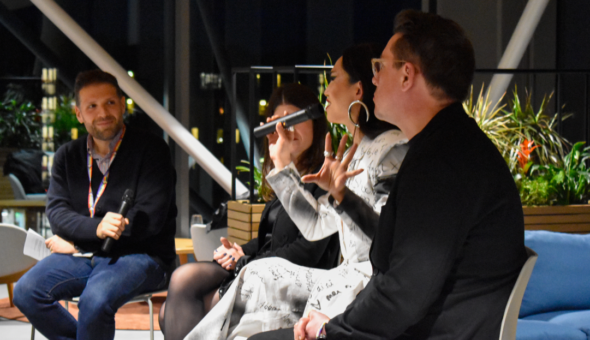This Black History Month, we hear from Dr Deborah N. Brewis and her colleagues Dr Angela Martinez Dy and Dr Sadhvi Dar at the ‘Building the Anti-Racist Classroom’ (BARC) Collective. Here they explore why it’s essential to acknowledge the impact of race within research, teaching and practice, and describe how the Collective is working to challenge the structural inequalities in Higher Education. They also explain how you can get involved in anti-racist work, using resources they’ve created.
Until recently - when more vibrant, anti-racist conversations have emerged, due to global social movements - Business, Management and Organisation Studies has tended to take a race-neutral approach to research, teaching, and practice. This is largely unhelpful in advancing racial justice for members of the Business School community because it makes it more difficult to identify and acknowledge the structural inequalities that have persisted throughout history. These interconnecting inequalities of race, power, and resource shape the contemporary social, economic, and commercial contexts in which we organise and do business. Without such recognition these conditions are nigh on impossible to challenge, and for anti-racist actions to achieve impactful and lasting change.
In 2017 a small collective of women of colour scholar-activists working in the field of Business, Management and Organisation Studies got together to challenge this norm.
The BARC Collective’s work
Through working together as 'Building the Anti-Racist Classroom' Collective (BARC) over four years, we have been developing anti-racist approaches to teaching and practice for our discipline. For us, and those we have connected with, the ‘classroom’ is an expansive concept that seeks to build communities among groups who are often disconnected from each other or marginalised by university management. For example, students, academics, professional staff, librarians, porters, cleaners, transport workers, local residents. Together, we critically examine and reimagine the practices and resources that structure university spaces: curricula, library collections, fee structures, assessment and feedback frameworks and so on.
Importantly, we see the relationship between communities and practices as ‘racialised’ and ‘affecting’. This means that racism conditions our feelings towards bodies in often invisible ways that restrict or violate Black bodies and bodies of colour in the university, while safeguarding and prioritising white bodies so that they may flourish. This understanding about race and affect and how these shape the classroom draws on Tate and Bagguley’s (2017) calls to ‘building the anti-racist university’. The BARC Collective has curated workshops which aim to help participants unlearn what our bodies have been conditioned to feel, and have built a project for learning that centers our desire to know each other and relate to each other in ways that support Black life and communities of colour.
Over time, BARC workshops have reached far beyond our own field to connect with projects originating in disciplines ranging from Law to STEM, in which we have found mutual support and inspiration. Over the course of the collective project, we have delivered workshops across the UK with international participants, written articles and blog posts to engage different audiences with the issue of racism in higher education, and become part of a community of students, activists and academics committed to the transformation of our places of learning. These experiences and collaborators have helped us to push ourselves as well as the participants of our workshops to imagine what an anti-racist classroom might look like, to have an opportunity to experience and model the dynamics of those spaces, and therefore to bring some of these elements into our spaces of teaching and learning.
A guide to creating your own anti-racist workshop
In 2021, members Dr Angela Martinez Dy, Dr Sadhvi Dar, and Dr Deborah N. Brewis worked with student organiser Niroshnee Ranjan to create a practical guide to running your own anti-racist workshops. Drawing on our experiences of collectivising and community building, the guide offers support to anti-racist scholars, students and practitioner communities in their own anti-racist journeys. With this guide we hope to contribute to the creation of intentional and proactive anti-racist work, particularly for the higher education context. In it, you will find workshop modules that we designed and facilitated. It provides detailed information about the different sessions you can run, how you can prepare for your workshop, our take on compensation for anti-racist labour, and more. The structure of the guide itself mirrors that of a BARC workshop: beginning with guiding principles and frameworks, moving into activities, and then encouraging reflections. This guide also provides insight into logistical issues such as participant registration and welcome packs.
BARC activities have been the inspiration for a number of other university anti-racist initiatives led by students, staff and allies (e.g. Loughborough Race Equity Town Hall, Exeter Active Together) from a variety of universities, as well as number of publications. This guide encapsulates the ethos and practices that have sparked anti-racist organising in UK HE. The release of this guide as a free community resource represents a culmination of the learning we benefitted from through undertaking the work of Building the Anti-Racist Classroom. At the heart of this guide lies the importance of collective un/learning and community building, and we continue to look to how the landscape of anti-racist strategy, practice and relations will develop. We hope that this guide helps encourage and empower you to explore bringing anti-racist approaches and content into your own educational practice, and to engage others in doing so too.
Artwork by Maria D’Amico.
Respond



